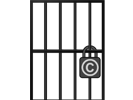Cyber Plagiarism & Statistics
 Plagiarism is a perennial temptation for students and an eternal challenge for teachers and writers, especially in the age of the Internet. An event during the summer of 2006, however, seemed almost a re-invention of plagiarism, at least to some who responded to it.
Plagiarism is a perennial temptation for students and an eternal challenge for teachers and writers, especially in the age of the Internet. An event during the summer of 2006, however, seemed almost a re-invention of plagiarism, at least to some who responded to it.
In June 2006 a message was emailed to fraternity and sorority chapters across the country advertising a new electronic repository for down-loadable college and university papers, as well as articles on various topics. The site was called "writing sucks" (link removed intentionally), and featured the slogan, Download your Workload.
Members of the Alliance for Computers and Writing (ACW) list-serve list fumed and argued about plagiarism in general and Writing Sucks
in particular.

 The Law of Plagiarism:
The Law of Plagiarism: What is plagiarism? In minor cases, it can be the quotation of a sentence or two, without quotation marks and without a citation (e.g., footnote) to the true author.
What is plagiarism? In minor cases, it can be the quotation of a sentence or two, without quotation marks and without a citation (e.g., footnote) to the true author.